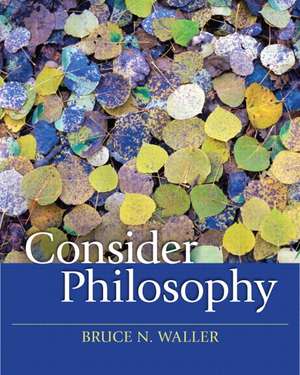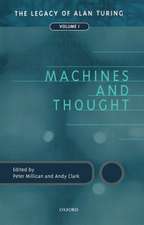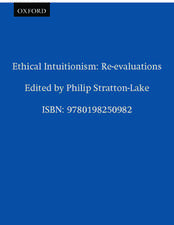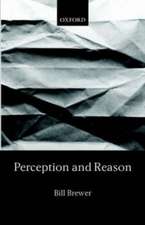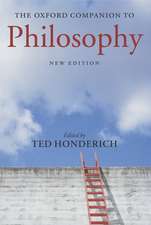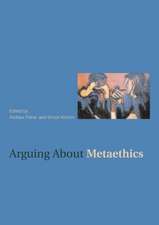Consider Philosophy
Autor Bruce N. Walleren Limba Engleză Paperback – 30 sep 2010
Preț: 892.79 lei
Preț vechi: 1159.47 lei
-23% Nou
Puncte Express: 1339
Preț estimativ în valută:
170.84€ • 178.82$ • 142.19£
170.84€ • 178.82$ • 142.19£
Carte disponibilă
Livrare economică 10-24 martie
Preluare comenzi: 021 569.72.76
Specificații
ISBN-13: 9780205644223
ISBN-10: 0205644228
Pagini: 494
Dimensiuni: 203 x 251 x 20 mm
Greutate: 0.77 kg
Ediția:1
Editura: Prentice Hall
Locul publicării:Upper Saddle River, United States
ISBN-10: 0205644228
Pagini: 494
Dimensiuni: 203 x 251 x 20 mm
Greutate: 0.77 kg
Ediția:1
Editura: Prentice Hall
Locul publicării:Upper Saddle River, United States
Descriere
Offering a balance of theory and applications through a mix of text and readings, Consider Philosophy begins with chapters covering philosophical theory, each of which is followed by related, classical readings.
Featuring selections from the world’s most influential philosophers, this combination of primary texts and explanatory pedagogy presents the material in a clear, accessible way that does not sacrifice rigor. Making connections among different philosophical theories throughout, the text helps students to engage the subject matter and apply theories to important contemporary philosophical issues.
Featuring selections from the world’s most influential philosophers, this combination of primary texts and explanatory pedagogy presents the material in a clear, accessible way that does not sacrifice rigor. Making connections among different philosophical theories throughout, the text helps students to engage the subject matter and apply theories to important contemporary philosophical issues.
Cuprins
Table of Contents
Chapter One: Thinking Critically and Cordially About Philosophy
Irrelevant Reason Fallacy
Ad Hominem Arguments
Strawman Fallacy
Appeal to Authority
Exercises
Glossary
Further Reading
Chapter Two: Philosophical Questions About Religion
Conceptions of God
Arguments for Existence of God
The Cosmological Argument
The Ontological Argument
The Argument from Design
The Intuitive Argument
Pascal’s Wager
The Problem of Evil
Ockham’s Razor
Do Science and Religion Occupy Different Spheres?
Readings
From Genesis and Exodus
Spinoza, from A Theologico-Political Treatise
Aristotle, from The Metaphysics
Leibniz, from Theodicy
Stephen Gould, “Non-Overlapping Magisteria”
Richard Dawkins, “You Can’t Have it Both Ways: Irreconcilable Differences?”
Questions for Thought
Glossary
Further Reading
Chapter Three: What Can We Know?
Skepticism
The Copernican Revolution
Descartes
Certainty
Descartes and Reason
Descartes’ Method of Doubt
I Think, Therefore I Exist
The Lasting Influence of Descartes
Readings
Descartes, Meditations, 1 and 2
Wittgenstein, from On Certainty
Questions for Thought
Glossary
Further Reading
Chapter Four: Rationalism, Empiricism, Kant
Rationalism
God said, Let Newton Be
Empiricism
John Locke
David Hume
Immanuel Kant
Readings
David Hume, An Enquiry Concerning Human Understanding, sections 2 and 12
Immanuel Kant, from Prolegomena to any Future Metaphysics
Questions for Thought
Glossary
Further Reading
Chapter Five: Contemporary Epistemology
Permanence and Change
Evolution
Darwin
Pragmatism
Readings
William James, from Pragmatism
Bertrand Russell, “Transatlantic Truth”
John Dewey, from Reconstruction in Philosophy
Questions for Thought
Glossary
Further Reading
Chapter Six: What Is the Mind?
Mechanism and the Mind
Descartes and Mind-Body Dualism
Advantages of Mind-Body Dualism
Problems for Mind-Body Dualism and Interactionism
Pre-Established Harmony
Occasionalism
Idealism
Materialism
Dual-Aspect Theory
Functionalism
Epiphenomenalism
Consciousness
Readings
Descartes, Meditations, 6
Daniel Dennett, “Where Am I?”
Thomas Nagel, “What Is It Like to Be a Bat?”
Questions for Thought
Glossary
Additional Reading
Chapter Seven: Personal Identity
Practical Implications of Personal Identity
Physical Identity
Souls and Personal Identity
Memory and Identity
Science Fiction and Personal Identity Problems
Beyond Personal Identity
Strains on Our Ordinary Concept of Personal Identity
Identity and the One
The Narrative Account of Personal Identity
Readings
John Locke, from Essay Concerning Human Understanding
David Hume, from A Treatise of Human Nature
Derek Parfit, from Reasons and Persons
Alasdair MacIntyre, from After Virtue
Questions for Thought
Glossary
Further Reading
Chapter Eight: Fatalism, Determinism, Free Will
Fatalism
Fatalism and Determinism
Determinism
Resistance to Determinism
Does Determinism Make God the Source of Evil?
Readings
Lorenzo de Valla, “Dialogue on Free Will”
Desiderius Erasmus, from A Disquisition upon Free Will
Martin Luther, from Bondage of the Will
David Hume, “Of Liberty and Necessity”
Questions for Reflection
Further Reading
Chapter 9: Is Free Will Compatible With Determinism?
Does Determinism Destroy Creativity?
Does Determinism Destroy Free Will?
Hard Determinism
Soft Determinism (Compatibilism)
Hume’s Compatibilism
Hierarchical Compatibilism
Challenges to Hierarchical Compatibilism
Rationalist Compatibilism
Readings
William James, from Pragmatism
Harry G. Frankfurt, “Freedom of Will and the Concept of a Person”
Susan Wolf, “Asymmetrical Freedom”
Questions for Reflection
Further Reading
Chapter 10: Are We Morally Responsible?
Libertarian Free Will
What About Moral Responsibility?
Should We Hold People Morally Responsible?
Strong Feelings and Moral Responsibility
Readings
Giovanni Pico della Mirandola, “Oration on the Dignity of Man”
C. A. Campbell, from On Selfhood and Godhood
Thomas Nagel, “Moral Luck”
Daniel Dennett, from Elbow Room
Bruce N. Waller, “Uneven Starts and Just Deserts”
Questions for Reflection
Additional Resources
Chapter 11: Ethics: Reason and Emotion
Kant vs. Hume
Utilitarian Ethics
Criticisms of Utilitarianism
Readings
David Hume, from A Treatise of Human Nature
Immanuel Kant, from Fundamental Principles of the Metaphysics of Morals, and The Critique of Practical Reason
Jonathan Bennett, “The Conscience of Huckleberry Finn”
John Stuart Mill, from Utilitarianism
Questions for Reflection
Additional Reading
Chapter 12: Ethical Theories
Divine Command Theory of Ethics
Relativism
Egoism
Social Contract Ethics
Care Ethics
Readings
James Rachels, “God and Human Attitudes”
George N. Schlesinger, from New Perspectives on Old-Time Religion
Elvin Hatch, “The Good Side of Relativism”
Thomas Hobbes, Leviathan
Jean Hampton,“Two Faces of Contractarian Thought”
Annette Baier,“What Do Women Want in a Moral Theory?”
Questions for Reflection
Additional Resources
Chapter 13: Are There Objective Ethical Truths?
Intuitionism
Virtue Theory
Ethical Nonobjectivism
The Argument from Diversity
The Argument from Queerness
Contemporary Moral Realism
Readings
W. D. Ross, from The Right and the Good
Aristotle, from Nicomachean Ethics
J. L. Mackie, from Ethics: Inventing Right and Wrong
Michael Smith, “Realism”
Richard Rorty, from Philosophy and Social Hope
Questions for Reflection
Additional Resources
Chapter 14: Political Philosophy
Justification of Government
Social Contract
Liberal and Conservative
Positive and Negative Liberty
Obeying or Disobeying the Law
Readings
Jean-Jacques Rousseau, from “The Origin of Inequality”
Henry David Thoreau, from “Resistance to Civil Government”
John Stuart Mill, from On Liberty
Questions for Reflection
Additional Resources
Chapter One: Thinking Critically and Cordially About Philosophy
Irrelevant Reason Fallacy
Ad Hominem Arguments
Strawman Fallacy
Appeal to Authority
Exercises
Glossary
Further Reading
Chapter Two: Philosophical Questions About Religion
Conceptions of God
Arguments for Existence of God
The Cosmological Argument
The Ontological Argument
The Argument from Design
The Intuitive Argument
Pascal’s Wager
The Problem of Evil
Ockham’s Razor
Do Science and Religion Occupy Different Spheres?
Readings
From Genesis and Exodus
Spinoza, from A Theologico-Political Treatise
Aristotle, from The Metaphysics
Leibniz, from Theodicy
Stephen Gould, “Non-Overlapping Magisteria”
Richard Dawkins, “You Can’t Have it Both Ways: Irreconcilable Differences?”
Questions for Thought
Glossary
Further Reading
Chapter Three: What Can We Know?
Skepticism
The Copernican Revolution
Descartes
Certainty
Descartes and Reason
Descartes’ Method of Doubt
I Think, Therefore I Exist
The Lasting Influence of Descartes
Readings
Descartes, Meditations, 1 and 2
Wittgenstein, from On Certainty
Questions for Thought
Glossary
Further Reading
Chapter Four: Rationalism, Empiricism, Kant
Rationalism
God said, Let Newton Be
Empiricism
John Locke
David Hume
Immanuel Kant
Readings
David Hume, An Enquiry Concerning Human Understanding, sections 2 and 12
Immanuel Kant, from Prolegomena to any Future Metaphysics
Questions for Thought
Glossary
Further Reading
Chapter Five: Contemporary Epistemology
Permanence and Change
Evolution
Darwin
Pragmatism
Readings
William James, from Pragmatism
Bertrand Russell, “Transatlantic Truth”
John Dewey, from Reconstruction in Philosophy
Questions for Thought
Glossary
Further Reading
Chapter Six: What Is the Mind?
Mechanism and the Mind
Descartes and Mind-Body Dualism
Advantages of Mind-Body Dualism
Problems for Mind-Body Dualism and Interactionism
Pre-Established Harmony
Occasionalism
Idealism
Materialism
Dual-Aspect Theory
Functionalism
Epiphenomenalism
Consciousness
Readings
Descartes, Meditations, 6
Daniel Dennett, “Where Am I?”
Thomas Nagel, “What Is It Like to Be a Bat?”
Questions for Thought
Glossary
Additional Reading
Chapter Seven: Personal Identity
Practical Implications of Personal Identity
Physical Identity
Souls and Personal Identity
Memory and Identity
Science Fiction and Personal Identity Problems
Beyond Personal Identity
Strains on Our Ordinary Concept of Personal Identity
Identity and the One
The Narrative Account of Personal Identity
Readings
John Locke, from Essay Concerning Human Understanding
David Hume, from A Treatise of Human Nature
Derek Parfit, from Reasons and Persons
Alasdair MacIntyre, from After Virtue
Questions for Thought
Glossary
Further Reading
Chapter Eight: Fatalism, Determinism, Free Will
Fatalism
Fatalism and Determinism
Determinism
Resistance to Determinism
Does Determinism Make God the Source of Evil?
Readings
Lorenzo de Valla, “Dialogue on Free Will”
Desiderius Erasmus, from A Disquisition upon Free Will
Martin Luther, from Bondage of the Will
David Hume, “Of Liberty and Necessity”
Questions for Reflection
Further Reading
Chapter 9: Is Free Will Compatible With Determinism?
Does Determinism Destroy Creativity?
Does Determinism Destroy Free Will?
Hard Determinism
Soft Determinism (Compatibilism)
Hume’s Compatibilism
Hierarchical Compatibilism
Challenges to Hierarchical Compatibilism
Rationalist Compatibilism
Readings
William James, from Pragmatism
Harry G. Frankfurt, “Freedom of Will and the Concept of a Person”
Susan Wolf, “Asymmetrical Freedom”
Questions for Reflection
Further Reading
Chapter 10: Are We Morally Responsible?
Libertarian Free Will
What About Moral Responsibility?
Should We Hold People Morally Responsible?
Strong Feelings and Moral Responsibility
Readings
Giovanni Pico della Mirandola, “Oration on the Dignity of Man”
C. A. Campbell, from On Selfhood and Godhood
Thomas Nagel, “Moral Luck”
Daniel Dennett, from Elbow Room
Bruce N. Waller, “Uneven Starts and Just Deserts”
Questions for Reflection
Additional Resources
Chapter 11: Ethics: Reason and Emotion
Kant vs. Hume
Utilitarian Ethics
Criticisms of Utilitarianism
Readings
David Hume, from A Treatise of Human Nature
Immanuel Kant, from Fundamental Principles of the Metaphysics of Morals, and The Critique of Practical Reason
Jonathan Bennett, “The Conscience of Huckleberry Finn”
John Stuart Mill, from Utilitarianism
Questions for Reflection
Additional Reading
Chapter 12: Ethical Theories
Divine Command Theory of Ethics
Relativism
Egoism
Social Contract Ethics
Care Ethics
Readings
James Rachels, “God and Human Attitudes”
George N. Schlesinger, from New Perspectives on Old-Time Religion
Elvin Hatch, “The Good Side of Relativism”
Thomas Hobbes, Leviathan
Jean Hampton,“Two Faces of Contractarian Thought”
Annette Baier,“What Do Women Want in a Moral Theory?”
Questions for Reflection
Additional Resources
Chapter 13: Are There Objective Ethical Truths?
Intuitionism
Virtue Theory
Ethical Nonobjectivism
The Argument from Diversity
The Argument from Queerness
Contemporary Moral Realism
Readings
W. D. Ross, from The Right and the Good
Aristotle, from Nicomachean Ethics
J. L. Mackie, from Ethics: Inventing Right and Wrong
Michael Smith, “Realism”
Richard Rorty, from Philosophy and Social Hope
Questions for Reflection
Additional Resources
Chapter 14: Political Philosophy
Justification of Government
Social Contract
Liberal and Conservative
Positive and Negative Liberty
Obeying or Disobeying the Law
Readings
Jean-Jacques Rousseau, from “The Origin of Inequality”
Henry David Thoreau, from “Resistance to Civil Government”
John Stuart Mill, from On Liberty
Questions for Reflection
Additional Resources
Notă biografică
Dr. Bruce N. Waller is Chair of the Department of Philosophy and Religious Studies at Youngstown State University. He received his Ph.D. in 1979 from the University of North Carolina at Chapel Hill. His other works include Consider Ethics: Theory, Readings, and Contemporary Issues, Critical Thinking: Consider the Verdict, You Decide! Current Debates in Criminal Justice, You Decide! Current Debates in Contemporary Moral Problems, You Decide! Current Debates in Introductory Philosophy, You Decide! Current Debates in Ethics, and Coffee and Philosophy: A Conversational Introduction to Philosophy with Readings.
Caracteristici
Hallmark Features:
A conversational style and reader-friendly text will appeal to the interests of both students and teachers alike.
An approach that emphasizes the strongest arguments and positions on each question; making clear that many philosophical questions remain open and disputed issues -- inviting students to draw their own conclusions.
All of the accessible readings were selected to engage students -- while ranging over key philosophical questions and eras, from Aristotle to contemporary work.
"Questions for reflection" sections introduce significant philosophical questions while avoiding simplistic “find the right answer” formats. They promote discussion by placing philosophical questions into the context of student life.
The subjects of this text are given firm grounding from which to begin dissection rather than posing philosophical issues as isolated exercises. For example: Rather than simply examining the question of skepticism, the text examines the social factors that prompt periods of skepticism; rather than considering questions about the mind as a purely abstract philosophical exercise.
"Further Reading" sections help identify extra material for students or teachers interested in expanding upon what the text already offers.
A glossary provides key defnitions of main concepts wihtin each chapter.
A conversational style and reader-friendly text will appeal to the interests of both students and teachers alike.
An approach that emphasizes the strongest arguments and positions on each question; making clear that many philosophical questions remain open and disputed issues -- inviting students to draw their own conclusions.
All of the accessible readings were selected to engage students -- while ranging over key philosophical questions and eras, from Aristotle to contemporary work.
"Questions for reflection" sections introduce significant philosophical questions while avoiding simplistic “find the right answer” formats. They promote discussion by placing philosophical questions into the context of student life.
The subjects of this text are given firm grounding from which to begin dissection rather than posing philosophical issues as isolated exercises. For example: Rather than simply examining the question of skepticism, the text examines the social factors that prompt periods of skepticism; rather than considering questions about the mind as a purely abstract philosophical exercise.
"Further Reading" sections help identify extra material for students or teachers interested in expanding upon what the text already offers.
A glossary provides key defnitions of main concepts wihtin each chapter.
Caracteristici noi
N/A
Recenzii
It is not overloaded and excessive, nor is it superficial and "dumbed down." It contains important primary readings, helpful "questions for thought," and a useful glossary at the end of each chapter. -Professor Robert Gall, WestLiberty StateCollege Wide-ranging, engaging, clear, comprehensible, geared toward students learning how to think philosophically rather than just understand or recite philosophical arguments. -Professor Julinna Oxley, Coastal Carolina University Its got broad topical and historical coverage and it's organized well for semester teaching. -Professor Sean Stidd, WayneState University "The strength of the book is its straightforward writing style that doesn't complicate things too much for intro students, and the questions for reflection that are at the end of the chapters. These are the kinds of questions my students could write an essay on instead of writing a paper." - Julinna Oxley, Coastal Carolina University "The text seems to strike the right balance in terms of the amount of material covered. It is not overloaded and excessive, nor is it superficial and "dumbed down." It contains important primary readings, helpful "questions for thought," and a useful glossary at the end of each chapter." - Robert Gall, West Liberty State College "The questions at the end of each chapter are great. They are not just questions of what was stated in the chapter, but are straightforward, compelling questions or thought experiments that students at any level could understand and attempt to answer. I also like the quotes in the boxes, which were from a wide variety of sources, including history and culture. These are useful and interesting without distracting from the main line of argument or questions being raised. The writing is also clear and straightforward, without too much complexity." - Julinna Oxley, Coastal Carolina University "The writing style is very clear and straightforward. This is great. The level is appropriate for students and is not so long-winded. (I think they would not complain about Waller's writing.) Also, the examples used to introduce the topics at the beginning of each chapter are great. He also guides the reader through how to think of the issues, and doesn't just try to explain things. Focus on determinism. Now that helps the student focus on the topic at hand which may be hard for them to do." - Julinna Oxley, Coastal Carolina University "I very much like the author's writing style and his introduction to key issues in philosophy. He makes complicated issues interesting and accessible and he locates them within a broader social perspective that includes historical facts, religious pressures, and political conditions. This would be a very welcome addition to my teaching introduction to philosophy." - Jennifer Lackey, Northwestern University
